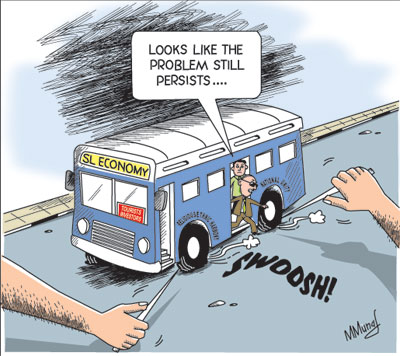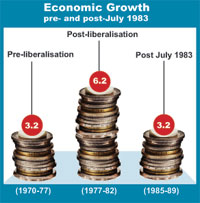Columns
Why unity and social harmony are crucial for economic development
View(s):No single factor has retarded the country’s economic development as much as ethnic disturbances. The cumulative economic impacts of the series of ethnic disturbances since independence are considerable though immeasurable.

Another setback to the economy due to communal violence could spell a death knell for the economy. Once again dark clouds of communal hostility may ruin economic growth. Nipping the hatred that is being stoked is vital to ensure peace and prosperity.
President Mahinda Rajapaksa has quite rightly and unequivocally stressed the need for national unity and harmony among the diverse communities in Sri Lanka in his 2013 Independence Day Speech: “Unity among communities and religious harmony are vital factors for the development of the country. Divisions among us will strengthen various hostile forces seeking to deny us our freedom. When all communities rise in unity, the forces hostile to the country will be weakened and freedom further strengthened. We celebrate the 65th anniversary of independence with firm determination and clear commitment to national unity.”
Stern action
This clear commitment to national unity must be backed by stern actions that deter acts of hatred and violence against any group or community. It is vital to take firm measures to defuse communal emotions to ensure national unity. Both Singapore and Malaysia were able to avoid communal violence owing to the firm governmental actions to not allow the arousal of communal feelings. Our experience of expecting ‘good sense to prevail’ is unrealistic, insufficient, and ineffective. Inaction by the government led to nearly three decades of terrorism and civil war.

Sri Lanka’s post-independent history is replete with economic setbacks owing to ethnic violence. The ethnic riots of 1958 were the initial setback to the country’s development. In addition to the physical destruction, human suffering and fatalities, it led to an exodus of talented persons in a first wave of a brain drain that were repeated too often. Post-1958 Sri Lanka was the poorer for the flight of academics, professionals, scientists, technicians and qualified persons and a depletion of the English educated.
Economic growth retarded
The initial post-liberalised years saw a re-emergence of the economy with prospects of achieving high rates of economic growth. In 1978 the economy grew by 8.2 percent. From an annual average economic growth of 3.2 percent during 1970-77, the economy spurted to an annual average growth of 6.2 percent in 1980-83. Then the ethnic violence of July 1983 dashed the country’s prospect of achieving a high trajectory of growth. In 1983-84 economic growth slipped to 5 per cent. The economy grew by only 3.2 percent during 1985-89.
The ethnic conflict in July 1983 impacted on the economy through the disruption of economic activities, fall in tourism and reduced foreign investment. The optimism and business confidence that was evoked by the economic liberalisation took a severe beating. It led to large scale out migration, the consolidation of the LTTE, terrorism and then the war. These had irreparable damage to the economy that cannot be quantified.
In his book Development Under Stress, Dr Saman Kelegama argues that, “The 17-year war was costly and deterred foreign and local investment, reduced tourist arrivals, caused immense damage to the country’s infrastructure, and above all led to many deaths and brain drain of skilled labour.”
He points out that: “The costly war, among others, led to large budget deficits (exceeding 8 per cent of GDP) during the 1990s. Large scale domestic and foreign borrowing to finance the budget deficit accumulated as large public debt over the years, so much so that by the year 2000, public debt to GDP ratio had exceeded 100 per cent. In 2001, the country faced an economic crisis consequent to the war escalating and international oil price hike in the year 2000.”
Foreign investment, so vital for a speedy takeoff of the economy, was choked. Kelegama points out specific impacts of the war on foreign investment: “The uncertainty created by the war was the main deterrent to foreign investment — which acted as a catalyst to the growth process. Some examples would suffice to indicate the missed opportunities. Two major electronic multinational companies — Motorola and Harris Corporation — had finalised plans to establish plants in the Export Processing Zone prior to the change in the political climate in 1983. Harris Corporation even started building a plant with an initial employment capacity of 1850 workers.
Both these companies withdrew from Sri Lanka after the 1983 ethnic riots. Motorola shifted to Malaysia and Harris Corporation went elsewhere leaving a half-built plant in Sri Lanka. Besides these two corporations, Marubeni, Sony, Sanyo, Bank of Tokyo, Chase Manhattan Bank, were in the pipeline to invest in Sri Lanka in the early 1980s. All these big companies decided against investing in Sri Lanka after 1983. Sri Lanka lost a major opportunity of taking a big leap forward because, if these investments had materialised, they would have given a strong signal to other large multinational companies to start industries in Sri Lanka.”
The impact of the war was far more pervasive than some of the specific areas of economic retardation that have been recognised as adversely affected by the war, such as fisheries and cultivation of food crops in the North and East, tourism, foreign investment and economic and social infrastructure. The cumulative impacts of the weak macroeconomic conditions, out migration, disruption of economic activities, drying up of foreign investment, crash of the tourist industry and the increasing risks perceived by local and foreign investors impeded economic development.
Post-war setback
The end of the war and the end of terrorism in May 2009 once again breathed a new optimism for the economy. Indeed there has been a resurgence of economic activity as evident in the growth of the economy by an annual average of 7.6 per cent in 2010-2012.
The economy of a country is an interrelated interconnected organic structure. The damage to one section damages the whole. Muslim enterprises are a vital component of the economy connected to various sectors of the economy. The malfunctioning or setback to such enterprises would have multifarious economic repercussions. The economy would not be able to fire with all its pistons with vital economic enterprises not functioning.

The current communal rumblings are a severe threat to the economy. In the midst of a global slowdown and other external setbacks, it is absolutely essential not to disrupt economic activities. The repercussions of another wave of ethno-religious violence would be horrendous. It would confirm to the international community that Sri Lanka violates human rights extensively.
It is frightful to contemplate what international interventions might result due to communal violence. Economic sanctions from economically important countries like the US and the countries of the European Union would destroy our exports that are already dwindling. The Arab world could impose embargoes on oil exports and tea imports. Sri Lankan workers could be banned from Middle Eastern countries. This would be a different proposition to our cricketers not participating in the IPL in Chennai, as over 50 percent of remittances are from the Middle East and remittances finance over 60 percent of our massive trade deficit.
What an awful economic scenario to contemplate: Exports falling, vital imports denied, remittances reduced drastically and capital outflows. The ensuing economic disaster would be horrific. An economic setback far worse than we have experienced in the past is inevitable.
Let us avoid such a horrific scenario. Let us act to restore communal and ethnic harmony that is an essential prerequisite to economic development. Let us learn from the lessons of July 1983 and not repeat the catastrophe. Are we about to flatten the country’s economic development? Unity and social harmony are a precondition for economic development in a diverse society such as ours.
Follow @timesonlinelk
comments powered by Disqus















